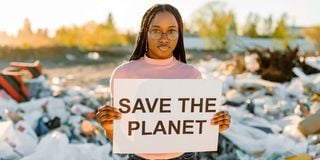Let women be at the heart of climate change conversations

A woman climate change activist.
Whatever the declarations from COP28, women must be put on a pedestal in the search for solutions. The climate crisis the world faces is, evidently, not gender-neutral and women and girls are increasingly finding themselves bearing its greatest impact.
The crisis significantly amplifies gender inequalities and poses unique threats to their livelihoods, health and safety—more so in Africa, where there is a higher reliance on natural resources for livelihood and survival than elsewhere.
Climate change evolves into a threat multiplier, escalating social, political and economic tensions in fragile and conflict-affected settings. The Intergovernmental Panel on Climate Change says girls and women are at higher risk of food insecurity and more likely to die in extreme weather events than boys and men. How, then, can they be meaningfully integrated into the climate change conversations?
The African Union (AU) has enshrined its commitment to gender equality in various frameworks, including Article 4(l) of the Constitutive Act, and initiated gender mainstreaming in its initiatives. Other regional and global bodies have done their bit. However, much more commitment is required.
Climate discussions
Commitments such as climate discussions must be translated into action. For centuries, women were excluded from decision-making, especially in the most critical sociocultural, economic, and political issues. But including them in climate action will create a more sustainable and equitable future.
Research is at the heart of climate mitigation and adaptation for it will be difficult to get accurate representation of Africa’s special needs and circumstances. Africa’s contribution to climate knowledge and research remains woefully tenuous but things are slowly changing and its women are now staking their claim in the climate change research space.
Ma-Lyse Nema, of Rwanda, a Mawazo Fellow, is researching landslides from changing land use in the Kivu catchment. Namibia’s Kemi Jegede is developing an optimal integrated supply chain and energy distribution network for rural communities, contributing to a just energy transition for rural Africa.
Interplay
In Tanzania, Miriam Laiser’s climate change work combines a social justice and health lens, exploring the interplay between climate change and the rising number of cases of communicable and non-communicable conditions such as autism spectrum disorders in children. The list is growing.
Many organisations are contributing in their own different ways, too. The Mawazo Institute, for instance, through its two innovative programmes, supports early career African women researchers, a sizable number of whom are engaged in critical climate research. It’s imperative that women be at the centre of these climate conversations!
Ms Tunnen is the communications lead at the Mawazo Institute. [email protected].





